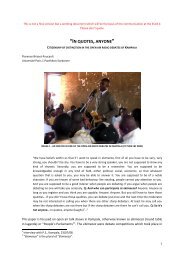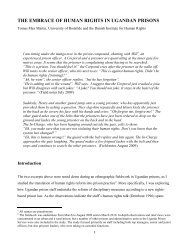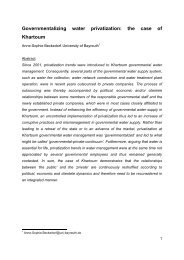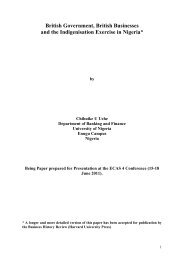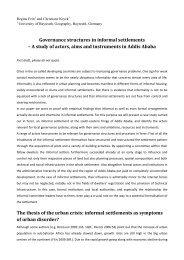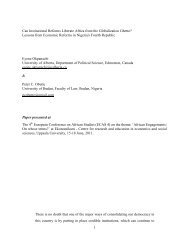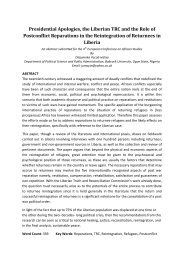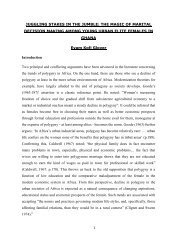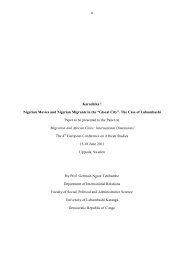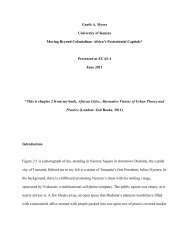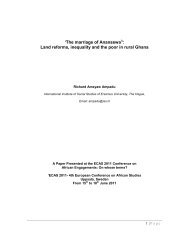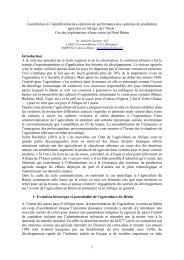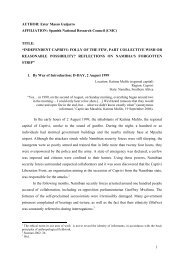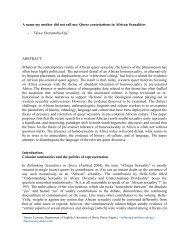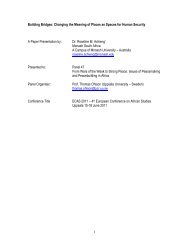Alemayehu Kumsa - Full paper - The Nordic Africa Institute
Alemayehu Kumsa - Full paper - The Nordic Africa Institute
Alemayehu Kumsa - Full paper - The Nordic Africa Institute
You also want an ePaper? Increase the reach of your titles
YUMPU automatically turns print PDFs into web optimized ePapers that Google loves.
elite we come to Ethiopia which can provide historical as well as contemporary<br />
examples of such power. <strong>The</strong> last Emperor of Ethiopia, Haile Sellasie, who ruled the<br />
Empire as Regent from 1916-1930, and as Emperor from 1930-1974 (except 1936-<br />
1941the period of Italian occupation) gave the first written constitution for his subjects<br />
in July 1931. Article 5 of this constitution declares that “By virtue of His Imperial<br />
Blood, as well as by anointing which He has received, the person of the Emperor<br />
is sacred, His dignity is inviolable and His power indisputable. Consequently, He<br />
is entitled to all the honours due to Him in accordance with tradition and the present<br />
Constitution.” (Eth. Constitution 1931: art. 5). On the occasion of the signature of the<br />
Constitution Haile Sellasie in his speech declared that “ We, Haile Sellasie I, Emperor<br />
of Ethiopia, have been called to the Empire by the Grace of God and by the<br />
unanimous voice of the people, and having received the Crown and the Throne<br />
legitimately by anointment according to law, are convinced that there is no better way<br />
of manifesting the gratitude which we owe to our Creator, Who has chosen Us and<br />
granted Us His confidence, than render ourselves worthy of it by making every effort<br />
so that he who comes after Us may be invested with this confidence and may work in<br />
conformity with the laws according to the principles established” and continues how<br />
the Constitution was established: “We have, after our elevation to the Imperial Throne,<br />
and second year of Reign in the Year of Grace 1923 (A.D. 1931), unasked and of<br />
Our own free will decreed the present State of Constitution” (Perham 1969: 423-4)<br />
(all emphasis are mine).<br />
In Abyssinia political culture, a person who became victorious in power struggle to capture<br />
the throne will be recognized by the Orthodox Christian Church which Donald Levine calls<br />
“as embodiment of national spirit” (Levine 1965: 267). Haile Sellasie was ascended to power<br />
through the palace coup against Lij Iyasu (Emperor of Ethiopia 1913-1916) organized by<br />
Amhara aristocrats and Orthodox Christian Church who refused to accept a person who is in<br />
his father´s side Oromo, a son of Menelik‟s daughter. Tafari Makonen was known after his<br />
coronation as “Haile Sellasie I, Conquering Lion of the Tribe of Judah Elected of God,<br />
Emperor of Ethiopia” (Ullendorff 1960: VI). After eliminating his political competitors by<br />
political intrigue, killing by poison, and killing political prisoners (it is believed that Haile<br />
Sellasie killed Lij Iyasu in prison during his way via Djibouti to England in 1936) (Warqineh<br />
and Melka 1986:1958 ).<br />
Comparing Colonial Powers



